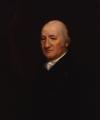Now has bright Sol fulfill'd his circling course,
Again to Taurus roll'd his burning car,
Since, cruel Prudence, thy resistless force
Tore me from happiness and Cynthia far.
How did I then, or pensively complain,
Or in the maniac's frantic accents rave!
How often vow to prove resistance vain,
And, spite of prudence, live my Cynthia's slave!
Her much-lov'd form did every thought employ;
My daily wish she was, and nightly dream;
My aking bosom hop'd no dearer joy;
My raptur'd fancy own'd no nobler theme.
No more I wish'd, where Isis' clear waves flow,
To pluck fresh laurels from the muse's shade:
I long'd to climb the Cambrian mountain's brow,
Since Cambria's mountains hid my favorite maid.
In vain from cruel love's tyrannic reign
To friendship and to wisdom I appeal;
For such my sufferings, that the amorous pain
Nor wisdom could assuage, nor friendship heal.
Now three revolving moons had roll'd away,
Still faded sorrow bent my drooping head;
In slothful rest my nobler passions lay,
Each fire extinguish'd, and each virtue dead:
When forced to seek a more laborious field,
And mingle chearful with a social train,
To toil and mirth those woes began to yield,
Which thought and care had combated in vain.
In other scenes I now delight could find,
And, far from Cynthia, found my heart at rest;
Till love at length the dubious strife declin'd,
And reason fix'd her empire in my breast.
Then, as by sacred truth's unflattering light,
I saw the follies of my former flame,
I turn'd indignant from the hateful sight,
Struck with remorse, and mortified with shame.
I found imagination's magic wand
Had all my Cynthia's dazzling charms supplied,
And love, misjudging love, with partial hand,
Had given those beauties nature's touch denied.
A visionary shape my Fancy drew,
In the fair form each polish'd grace display'd;
Then like the fabled artist amorous grew,
And lov'd the image which itself had made.
Elegy VI
written byHenry James Pye
© Henry James Pye






